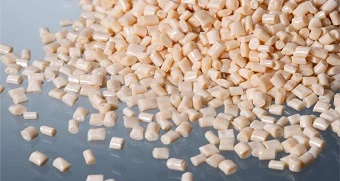Polyphenylene Sulphide: A Vital Component in the Age of Electrification & Lightweighting
05 May 2025 • by Natalie Aster

In today’s rapidly evolving industrial landscape, where electrification and lightweight engineering are becoming essential, Polyphenylene Sulphide (PPS) has quietly positioned itself as one of the most critical materials of our time. It's not just another high-performance plastic – it’s a foundational component in technologies that power electric vehicles, streamline advanced electronics, and make modern manufacturing smarter, faster, and more sustainable.
Why Polyphenylene Sulphide Is More Relevant Than Ever
PPS stands out because it offers something rare: the ability to perform under pressure, literally and figuratively. It maintains its structural integrity in extremely high temperatures, resists corrosive chemicals, and stays dimensionally stable even when exposed to moisture or aggressive environments. In other words, it doesn’t crack under stress, making it a dream material for engineers tackling the complex demands of modern machinery and electronics.
And as the world leans harder into electrification, especially with the surge in electric vehicle (EV) production, the qualities PPS brings to the table are no longer optional – they're essential.
Powering the Future of Electric Mobility
Electric vehicles operate under vastly different conditions compared to traditional combustion-engine cars. The components inside them have to be lighter, more compact, and capable of handling high voltages and rapid temperature changes. PPS meets these challenges head-on.
Whether it’s insulating a motor, forming the housing for a battery module, or ensuring the safe transfer of electricity through high-voltage connectors, PPS provides the thermal and electrical stability these applications demand. Unlike many conventional materials, it doesn’t warp or degrade under heat, which means safer, longer-lasting EVs and fewer maintenance headaches.
As automakers race to increase EV range and efficiency, lightweighting becomes a crucial factor. Replacing heavy metal parts with PPS-based alternatives can significantly reduce vehicle weight without compromising strength or reliability. And that directly translates to better energy efficiency and performance on the road.
Beyond EVs: The Broader Role of PPS in Innovation
Although PPS has become synonymous with the EV revolution, its applications extend well beyond the auto industry. It’s equally transformative in industrial automation, consumer electronics, and even aerospace engineering.
In electronics, miniaturization is the name of the game. Devices keep getting smaller, but they also need to be more powerful and reliable. PPS’s ability to be injection-molded into complex, tight-tolerance shapes makes it ideal for connectors, switches, and high-frequency components. Plus, its flame-retardant nature provides added safety, especially in compact devices that generate a lot of heat.
In industrial settings, PPS thrives in chemical plants, automation equipment, and fluid handling systems where it has to endure harsh conditions without breaking down. Its resistance to corrosive fluids and solvents means it can handle everything from hydraulic oils to acids, offering long-term reliability in critical systems.
Even in the aerospace sector, where weight reduction is directly tied to fuel savings, PPS is being used to replace heavier metal components while still delivering the performance needed in high-stress environments.
Engineering Benefits That Make a Difference
What makes PPS so valuable isn’t just one standout feature – it’s the full package. It offers a unique blend of heat resistance, chemical durability, mechanical strength, and electrical insulation. And while many materials can check off one or two of these boxes, very few can deliver all of them at once, especially in such a process-friendly form.
Manufacturers love working with PPS because it can be easily molded or extruded into precise shapes, reducing waste and allowing for high-volume production. It also maintains its form and function over time, even under constant thermal cycling or exposure to moisture, making it ideal for applications where consistency is critical.
A Material Built for Sustainability
In a world that’s increasingly focused on environmental responsibility, PPS also plays a quiet but important role in promoting sustainability. Because it's so durable, components made from PPS last longer, reducing the need for replacements and lowering overall material waste. In vehicles, the lightweight properties of PPS contribute directly to energy efficiency, helping reduce fuel consumption and extend the range of EVs.
And while it’s not a biodegradable material, PPS can be recycled in certain forms, especially in industrial settings where take-back programs or closed-loop systems are in place. Its long life cycle and efficiency gains make it a strong ally in the push toward greener engineering.
What the Future Holds for PPS
As industries continue to evolve, the expectations placed on materials will only get higher. Engineers are under pressure to design smarter, safer, and more efficient systems, and they need materials that can keep up.
Polyphenylene Sulphide is already proving that it’s more than capable. Its ability to meet strict performance requirements while supporting trends like electrification, miniaturization, and lightweighting makes it one of the most valuable thermoplastics on the market today. And as technology continues to push boundaries, PPS will only become more integral to our daily lives, often in ways we don’t even notice.
Concluding Thoughts: The Unsung Hero of Modern Engineering
We rarely stop to think about the materials that power our devices, move our vehicles, or manage our infrastructure, but PPS is behind many of them. From the guts of an electric vehicle to the heart of your home electronics, it’s working silently to deliver performance, safety, and efficiency.
In the age of electrification and lightweighting, Polyphenylene Sulphide isn’t just relevant, it’s essential. It represents the future of high-performance engineering and will continue to shape the technologies that define our modern world.
Product Details:
Polyphenylene Sulphide (PPS) 2025 Global Market Review and Forecast to 2034
Published: May 2025
Pages: 60
Market Publishers boasts a rich collection of insightful research studies covering the chemicals and petrochemicals market, find it in the Polymers Market Reports Catalogue.
CONTACTS
The Market Publishers, Ltd.
Natalie Aster
Tel: +357 96 030922
[email protected]
MarketPublishers.com
Analytics & News
